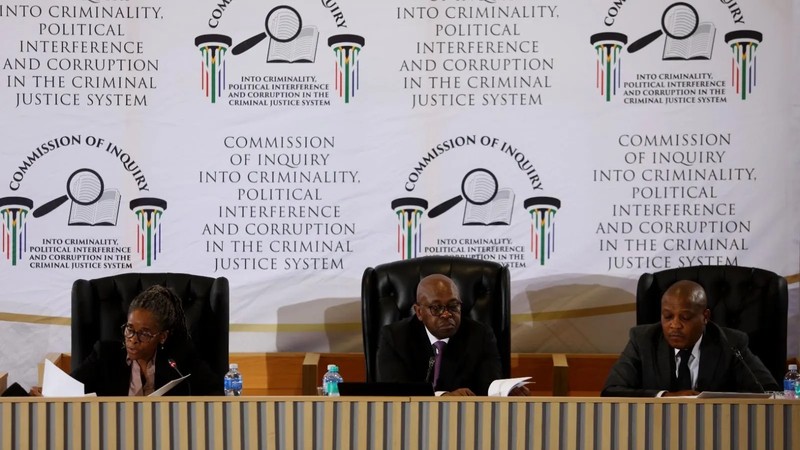Explosive testimony at the Madlanga Commission, with witnesses making serious allegations that elements within the judiciary may be compromised, has seen political parties demanding swift action.
The allegations primarily revolve around alleged impropriety in bail proceedings in Gauteng courts, particularly in high-profile cases.
The Commission was established after KwaZulu-Natal police commissioner Nhlanhla Mkhwanazi in a July press conference made startling allegations about political interference in the police.
He then told the Commission that there was impropriety in Chief Magistrate Vusi Mahlangu granting bail conditions in a case involving General Dumisani Khumalo.
Two police detectives, Witness A and Witness B (their identities are protected by the Commission) gave testimony where they said they believed there was impropriety in Katlego “KT” Molefe’s bail appeal, presided over by Acting Judge President Aubrey Ledwaba.
The detectives said crime intelligence had revealed that Molefe paid R2.5 million for bail to be granted and that payment was made to the judge and or the prosecutor.
The Umkhonto weSizwe Party (MKP), through its president Jacob Zuma, has been vocal in its demand for accountability.
Zuma called for a lifestyle audit of judicial members and reiterated the party’s commitment to supporting the work of the Parliamentary Ad-hoc Committee, which is also investigating allegations made by Mkhwanazi.
“As the MK Party, we demand full accountability from those implicated and therefore, we will use every parliamentary and legal instrument at our disposal to ensure that the truth triumphs over corruption and cover-ups,” Zuma said.
The African Transformation Movement (ATM) said the allegations surrounding the R2.5 million bribe involving Katiso Molefe must be taken seriously.
The party is calling for an independent commission to investigate the bribery allegations, stricter oversight mechanisms within the judiciary, and public hearings to rebuild trust.
Spokesperson Zama Ntshona emphasised the need for legislative changes to strengthen anti-corruption laws, enhanced penalties for judicial bribery, and robust protection for whistleblowers.
“This commission should include members with no prior connections to the judiciary or political entities to ensure impartiality,” Ntshona said.
The EFF’s national spokesperson, Thembi Msane, indicated a more cautious approach, stating that the party “will wait for all processes such as the parliamentary ad hoc committee to be concluded before taking action”.
The judiciary, through Chief Justice Mandisa Maya, has acknowledged the gravity of the situation.
While emphasising that the claims against Judge this is “an allegation yet to be tested and proved,” Maya acknowledged its potential to damage judicial integrity.
The Chief Justice reiterated the judiciary’s plea for anyone with evidence of a judge’s misconduct to “promptly lodge a complaint against that Judge with the Judicial Conduct Committee (JCC) of the Judicial Service Commission (JSC)”.
Maya confirmed discussions with Judge Ledwaba, who strenuously denies receiving any money for Molefe’s bail and has declined special leave, asserting his right to present his side of the story at the Madlanga Commission.
The National Association of Democratic Lawyers (NADEL), represented by spokesperson Lizelle Haskins, expressed “deep concern the recent unsubstantiated allegations made against members of the judiciary, including the honourable Acting Judge President Ledwaba”.
NADEL reaffirmed its belief in the “independence, integrity, and constitutional role of the judiciary,” stressing that it is “the guardian of our democracy and the final refuge for South Africans seeking fairness and justice”.
Alison Tilley, a spokesperson for Judges Matter, underscored the importance of concrete evidence.
“The difficulty with this whole situation is that you have people giving evidence under oath but its not enough!.. People who investigate crime should be able to give evidence…we are asking ourselves what evidence they have done?..so far they have not been able to point out evidence… its mere speculation,” she said.
She further urged witnesses at the Madlanga Commission to provide substantiating information so that statements can be dealt with through formal complaints to the Judicial Service Commission and the Magistrates Commission.
The legal NGO urged Judge Ledwaba and Chief Magistrate Mahlangu to go on special leave while such complaints are lodged and said that “neither the JSC nor the Magistrates Commission can deal with the allegations made until formal misconduct complaints under oath are filed,” as these commissions require sworn affidavits with supporting facts and evidence.
